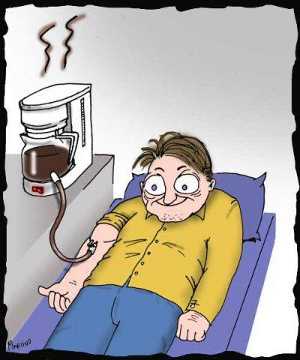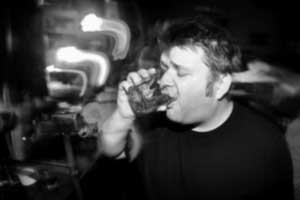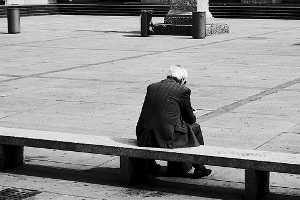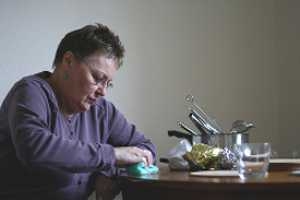Are You a Coffee Addict?
How to tell if caffeine is ruling your life, and what to do about it
 "Serious coffee addiction" courtesy of The Gifted Photographer
"Serious coffee addiction" courtesy of The Gifted PhotographerCoffee addiction was the last thing on his mind. Or mine. Geoff had come to see me for help with depression, anxiety, and insomnia. We'd taken an hour talking through his life. I'd asked in detail (or so I thought) about his work, life, and marriage. Toward the end of the session, he casually mentioned: "Yeah, I love coffee; I drink twenty cups a day!"
"Whoa! Sorry; I thought you said twenty cups a day!"
"Well, between twenty and thirty."
"Real coffee?"
"Yeah."
"And you feel depressed for no reason, agitated, restless, and tense?"
"Err, yes."
Sometimes I go off looking for complicated stuff when the cause (or at least a major contributing factor) is right under my nose. Over the coming weeks as Geoff weaned off coffee, he began to relax more, sleep better, and enjoy life again. Coffee is a drug; drugs change the way people feel. Therapy isn't always rocket science (although his nervous system was being rocket fuelled!).
"Ah!" you might say. "But that was extreme, wasn't it? That amount is crazy. I don't drink anywhere near that much, so I can't be addicted to coffee... can I?"
Can't you? Well, let's take a quick look.
Coffee addiction: How much is too much?
Hugely excessive caffeine consumption (remember tea, colas, and chocolate, too) is associated with anxiety and depression. But even consuming just over five cups of coffee a day is linked with increased anxiety and depression (1).
I love coffee myself, but I know that if I drink more than a few cups a day I suffer the jitters and don't sleep as well. I can't imagine drinking as much as Geoff did. But am I being unfair on coffee?
Coffee addiction v. coffee benefits
Okay, the key here (as with most things) is moderation. In a moment we'll look at whether you may be addicted, but first a word in coffee's defense. Some coffee may be good for us. The jury's out, but a little daily dose of the black stuff (around two cups a day) may help our hearts and ward off the blues, according to some research (2).
Coffee drinking can psychologically prepare you for the day and be a social prop ("Let's meet up for a coffee." vs "Let's meet up and stare at the wall."). And, according to some studies, some coffee drinking may delay the onset of senile dementia.
But other studies suggest that coffee (even in smallish doses), being a central nervous system stimulant, can be harmful to the cardiovascular system and stress the adrenal glands (3). There's little doubt that if you drink more than two or three cups of coffee a day, you can have heightened nervousness, more rapid heartbeat, and trembling hands.
Are you addicted to coffee? Do you want to find out? Do you need to get coffee first?
Let's get on with it! Do you, for instance:
- Regularly use coffee as a crutch to raise your energy throughout the day?
- Do you feel irritable or 'foggy' if you haven't had one in a while?
- Do you suffer feelings of withdrawal if you stop drinking coffee for a while?
- Do you find it difficult to focus on tasks if you're 'due' a coffee?
- Do other people ever mention how much coffee you drink?
If you answered yes to one or more of these questions, then you may be more or less addicted to coffee. So what are the best ways to cut down?
1) Cut down
Okay, this one sounds obvious; Geoff started to cut down. Stopping dead - although many people do - can be too daunting. So if, for example, you have ten cups a day, consider having coffee number one as normal, replacing coffee number two with a green tea, coffee for drink three, then having a green tea, and so on. In this way, you're cutting your coffee intake in half but keeping the ritual of having a hot drink.
2) Say goodnight to coffee earlier
Caffeine can stay in your system for many hours, so work towards having your last coffee earlier in the day. Sometimes Geoff would drink his final coffee at 10pm. If he hadn't suffered insomnia, I think there would have been something wrong with him. Aim to bring the time of your last coffee forward by half an hour a day until it's around midday.
3) Change your routine
The psychological aspect of any addiction tends to be a much greater pull than any physical aspect. If you were to scratch your nose every time you have a break at work, met a friend, watched certain TV shows, or ate your lunch, then pretty soon not scratching your nose whilst doing these things would start to feel a little weird.
But nose scratching isn't also chemically addictive. So if normally you'd sit down at work for a coffee break - then walk around the block instead. If you'd normally meet your friends in a coffee shop, meet them there - but have a fruit juice; or meet them in the park and play Frisbee. Mix up your routine a bit to loosen coffee's influence.
4) Drink more water
Drinking clean water is healthy. If you drink a cup (8 oz) of water when you get the urge to have a coffee, you'll find the urge for coffee passes because the need for fluid has already been met. A word of caution, though; don't do this before bedtime unless you want to wake up from dreaming about the Poseidon Adventure.
5) Regularly remind yourself why you're drinking less coffee
Whenever coffee tries to tempt you, remind yourself how jittery, on edge, nervy, or irritable you feel when you have too much coffee. Tell yourself that you really don't want to be like that and would rather enjoy feeling balanced calm and genuinely focussed (rather than slightly manic). If you get tired during the day, what you really need is natural rest, not artificial stimulation. Take ten minutes out to relax and have a 'power nap' or just take time out to sit still for a while until you feel more energized.
And think of coffee as an occasional treat rather than as an essential part of all you do. Although it may feel like it right now, coffee isn't oxygen.
References
- J.F. Gredan, P. Fontaine, M. Lubertsky, and K. Chamberlain (1978). "Anxiety and depression associated with caffeinism and academic performance". American Journal of Psychiatry, 138, 512-14.
- Coffee contains tannin and antioxidants, which are good for the heart and arteries, says dietician Chiara Trombetti of the Humanitas Gavazzeni institute in the northern Italian town of Bergamo. It is good for the liver and can help prevent cirrhosis and gallstones. It can relieve headaches, and the caffeine in coffee can reduce the risk of asthma attacks and help improve circulation within the heart. But more than three cups a day can reverse any benefits.
- "Caffeine Can Decrease Insulin Sensitivity in Humans". Gerben B. Keijzers, MD, Bastiaan E. De Galan, MD1, Cees J. Tack, MD, and Paul Smits, MD, Department of Pharmacology-Toxicology 233, University Medical Center Nijmegen. And: Debrah, K., Haigh, R., Sherwin, R., Murphy, J., Kerr, D.: Effect of acute and chronic caffeine use on the cerebrovascular, cardiovascular, and hormonal responses to orthostasis in healthy volunteers. Clin Sci Colch, 89:475–480, 1995.






